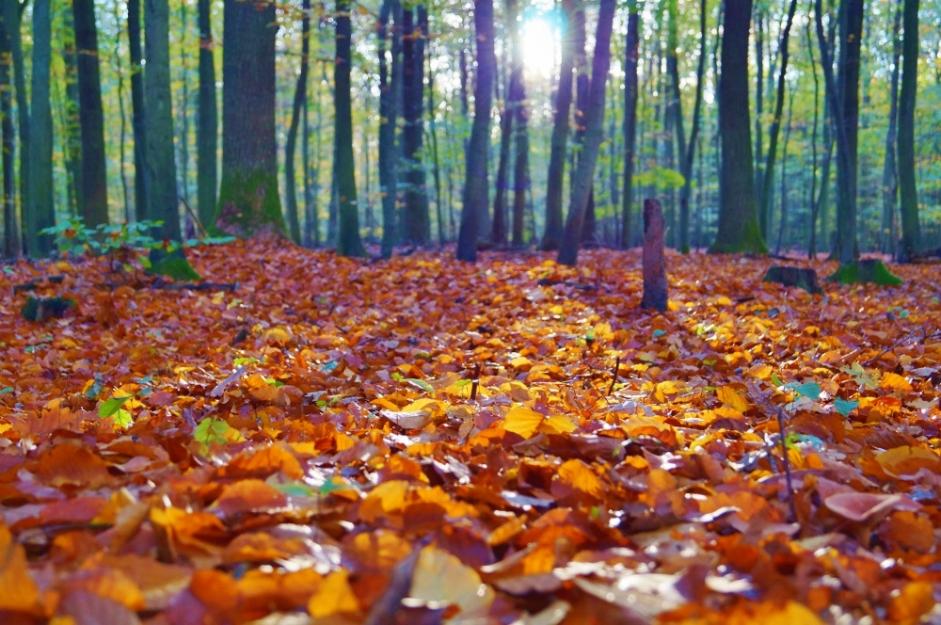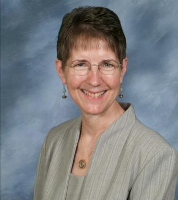
(Unsplash / Vision Webagency)
Take a look out the window or just think about the last time you were outside.
- Is (or was) it hot, warm or cold, sunny or cloudy, breezy or still, dry or wet?
- What can you observe — see, hear or feel — that isn't caused by people?
- What influence does nature have on your life?
- What influence do you have on nature?
Climate change invites taking time
The wind has a bite in it. The air is crisp. Sun pours down through the tree branches, which are still clothed but now with a vibrant array of colors — gold, red, purple, orange, pink, magenta, blue and brown. A little later, these leaves will flutter to the ground and attract in a different way. Piles of leaves invite you to return to your younger years as you run right into them and crunch them beneath your feet. Your senses come alive to the beauty of nature and of our Earth home.
Stopping and taking time to engage the beauty of autumn, as the leaves regale us with their beauty and beckon us to come closer and see nature in new ways, may be a key way to respond to the urgency of climate change.
The Oct. 8, 2018, U.N. report from the Intergovernmental Panel on Climate Change (IPCC) states that a global temperature rise of 1.5 degrees Celsius (2.7 degrees Fahrenheit) is the limit the planet cannot cross without suffering some of the worst effects of climate change. Temperatures have already risen 1 degree Celsius (since pre-industrial times), and unless significant changes are made in the global commitment to change policies and practices, the planet could pass the limit by 2030.
Even in the face of such an alarming forecast based on factual data, there are still people who do not accept this reality. The data seems so clear, and yet many people are not moved. For some, it is too complex. Others believe some leaders who say it is not such a big problem. And still others are so scared at such a possibility that they simply refuse to see it.
Perhaps one of the greatest reasons for resistance is that the reality of climate change demands that we change:
- To change the lifestyle to which we have become accustomed
- To stop our dependence on fossil fuels, which in turn decreases the profits and the power of all the related industries and corporations
- To change our habits of consumption and disposal
- To transform how we view the role of the human in the enterprise we call life
To take in the threat of climate change, we must acknowledge our connectedness with each other on this planet Earth no matter where we live. We must see that what we do as humans affects all other sentient and non-sentient beings, as well as the very chemistry of the atmosphere itself. We must acknowledge that we are in service to the future generations of all species and to the planet.
These realizations do not come from data alone.
It may seem counterintuitive, but I believe what we are learning about climate change and the urgency to address it is actually inviting us to stop and become aware of our earthly surroundings:
- To take time to go outside, to walk in parks and sit by the water
- To hear the rustling of the leaves or the singing of the wind
- To feel the caress of the breeze or the chill of the air
- To take the time to watch the changing leaves or flocks of geese flying south — reminding us of the cycle of life and death and the value of migration across borders
- To become one with our surroundings.
Climate change is the bellwether of recognition that what happens to our atmosphere happens to each of us and that our future depends on the health of the planet.
It seems to me that inviting people for whom climate change is not important to "take a long loving look at the real" that surrounds us in our natural habitat is a first step toward understanding why climate change needs to be addressed now.
We need to encourage people to engage with nature — perhaps with a forest — in a contemplative way:
- To come and sit within nature's cathedral
- To sit or lie down allowing one's body to feel Earth and to become truly "grounded"
- To relax and breathe deeply, to take in the various sensations of nature's carpeted floor
- To follow one's breath.
- In the silence of the space to let go of all our preconceived notions of nature and humans — all the ways we have been told we are so separate and different — to let go and simply encounter what is
I believe that encounter, where our "roots" join, will lead to startling discoveries. We need to stay in that deep space to hear what one can never hear in the hustle and bustle of a world that primarily sees trees, plants, insects, animals, minerals and precious metals as mere commodities for the use of humans.
It will lead to an understanding that our futures are connected. Both humans and nature want to live fully into the future. Both must do what they can to ensure a healthy planet. It seems nature is trying to do its part. It is incumbent on us to do ours.
Discussions about climate change usually are loaded with alarming statistics and urgent calls for change.
- Was it surprising that this article encouraged you to lie on the ground and contemplate nature?
- Would slowing down and taking a fresh look at nature be a change from the way you spend your time?
- How might the world change if everyone — including powerful people responsible for decisions that affect our environment — took time to encounter creation?
The Bible begins with two stories about creation. Common to both is the responsibility that God gives humans.
"The Lord God then took the man and settled him in the garden of Eden, to cultivate and care for it." Genesis 2:15
- Why do you believe that God chose humans, out of all the creatures, to give responsibility for all others and the Earth itself?
Cultivating means both preparing soil to sow seeds and nurturing what sprouts from the ground. How might the guidance of this article cultivate effective discussion about climate change?
Pope Francis chose his papal name to honor St. Francis of Assisi, the patron saint of those who promote ecology. He studied science before he became a priest. Care for God's creation is important to him and the church. In 2015, Francis wrote "Laudato Si', on Care of our Common Home," a message that calls every person on the planet to talk about how we're shaping its future. In it, he said:
A very solid scientific consensus indicates that we are presently witnessing a disturbing warming of the climatic system. In recent decades this warming has been accompanied by a constant rise in the sea level and, it would appear, by an increase of extreme weather events, even if a scientifically determinable cause cannot be assigned to each particular phenomenon. Humanity is called to recognize the need for changes of lifestyle, production and consumption, in order to combat this warming or at least the human causes which produce or aggravate it.
- Pope Francis joins many scientists, as well as the sister who wrote this article, in urging people to change their lifestyles and behaviors. What are some reasons his voice is important to this discussion?
- What are some changes — both little and big — that Catholics and their parishes and schools can make to curb the effects of climate change?
Members of the Sisters, Servants of Immaculate Heart of Mary (IHM) congregation, including Sr. Nancy Sylvester, strive to be conscious of how the way they live affects the environment. A survey among the sisters showed that most of them do this through activities such as:
- Reducing, reusing, repurposing and recycling
- Conserving energy
- Learning more about their actions affect the environment
- Studying Pope Francis' Laudato Si'
- Exploring their spiritual connection to the environment
Some, but fewer, of the sisters grow their own food or eat vegetarian diets.
- What are some things that you do to live in harmony with the environment?
- What is a practice of the IHM sisters that you can try?
- The Catholic Climate Covenant offers practical ideas for your parish or school to care for creation. Check out this list, then visit with your pastor, principal or another leader to explore one or more to try.
- Read this article about what Catholic leaders are saying about climate change. Consider writing a letter to a national leader to voice your thoughts.
God of all creation, you give us every good gift to nurture and use.
Guide us to be better caretakers of the Earth, and give us the courage and wisdom to make sacrifices and discover solutions to the challenges we must face for the good of all creatures.
Amen.
Tell us what you think about this resource, or give us ideas for other resources you'd like to see, by contacting us at education@globalsistersreport.org
